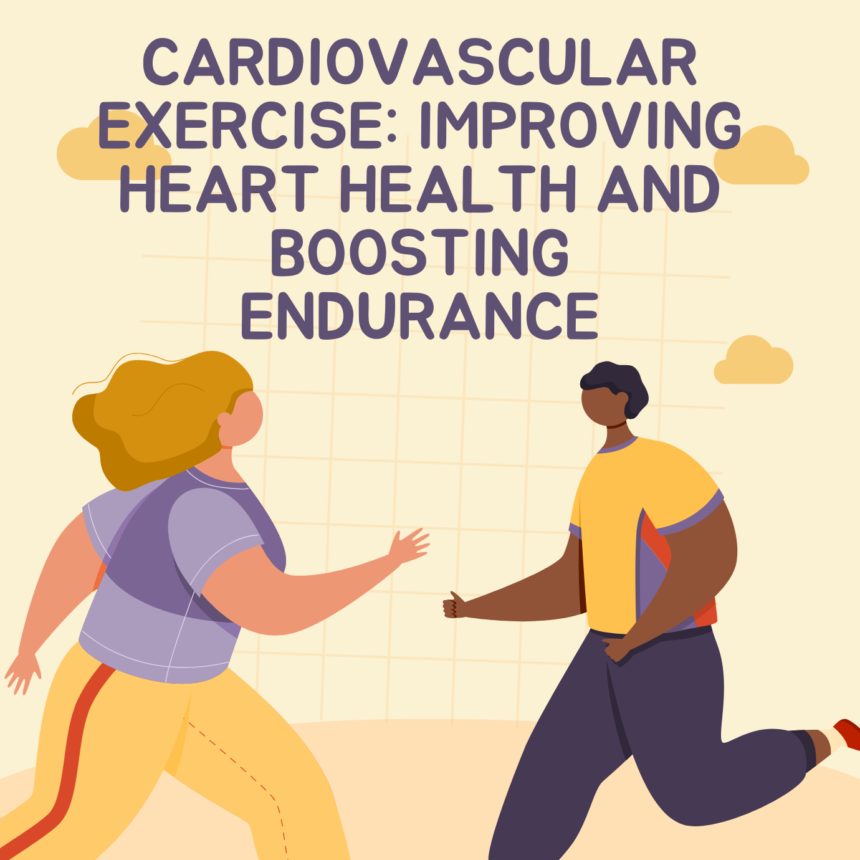Cardiovascular exercise, also known as cardio or aerobic exercise, plays a vital role in improving heart health, boosting endurance, and contributing to overall fitness. By engaging in regular cardiovascular exercise, you can experience a range of benefits that positively impact your cardiovascular system and overall well-being. Let’s explore the benefits and considerations of cardiovascular exercise:
1. Improved Heart Health: Cardiovascular exercise strengthens the heart muscle, making it more efficient at pumping blood. It helps lower resting heart rate, reduces blood pressure, and improves blood circulation. Regular cardio workouts can lower the risk of heart disease, stroke, and other cardiovascular conditions.
2. Increased Endurance and Stamina: Cardio exercises such as running, cycling, swimming, or brisk walking improve endurance and stamina. Regular cardio workouts enhance the body’s ability to utilize oxygen efficiently, increasing the capacity to perform physical activities for longer durations.
3. Weight Management and Fat Loss: Cardiovascular exercise is an effective way to burn calories and contribute to weight management. It helps create a calorie deficit, which can lead to fat loss when combined with a balanced diet. Engaging in high-intensity cardio workouts can also boost metabolism, promoting continued calorie burn even after exercise.
4. Mood Enhancement and Stress Reduction: Cardio exercises stimulate the release of endorphins, which are natural mood-enhancing chemicals in the brain. Regular cardio workouts can help alleviate stress, reduce symptoms of anxiety and depression, and improve overall mental well-being.
5. Increased Lung Capacity: Cardiovascular exercise challenges the respiratory system, improving lung capacity and oxygen uptake. Over time, this can enhance your overall respiratory efficiency and make daily activities feel less taxing.
6. Enhanced Energy Levels: Regular cardiovascular exercise boosts energy levels and combats fatigue. It improves the delivery of oxygen and nutrients to tissues, supporting overall vitality and reducing feelings of tiredness.
7. Better Sleep Quality: Engaging in cardiovascular exercise can help regulate sleep patterns and improve sleep quality. Physical exertion during cardio workouts promotes better sleep onset, deeper sleep, and overall sleep efficiency.
8. Bone Health: Weight-bearing cardio exercises, such as running or jumping rope, can help improve bone density and reduce the risk of osteoporosis. These exercises stimulate the bones, promoting bone strength and reducing the likelihood of fractures.
9. Considerations and Safety: When incorporating cardiovascular exercise into your routine, it’s essential to consider your fitness level, any underlying health conditions, and your personal goals. Start at a comfortable intensity and gradually increase the duration and intensity of your workouts. It’s advisable to consult with a healthcare professional before starting a new exercise program, especially if you have any pre-existing medical conditions.
10. Variety and Progression: To maximize the benefits of cardiovascular exercise, incorporate a variety of activities into your routine. This can include jogging, swimming, cycling, dancing, or using cardio machines at the gym. Additionally, focus on progression by gradually increasing the duration, intensity, or difficulty of your workouts to continue challenging your cardiovascular system.
Remember to warm up before each cardio session and cool down afterward. Stay properly hydrated and listen to your body, allowing for rest and recovery when needed. By making cardiovascular exercise a regular part of your routine, you can improve heart health, boost endurance, manage weight, and experience numerous physical and mental health benefits.
